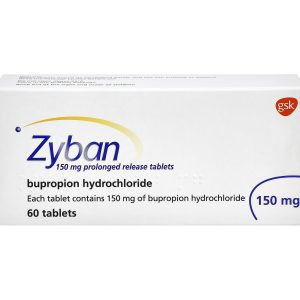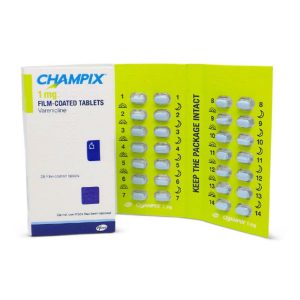Showing all 2 results
It’s no secret that smoking can cause severe damage to your health. However, breaking this habit can sometimes seem impossible. As an experienced pharmacy, we are here to assure you that quitting is definitely within your reach.
In this comprehensive guide, we will shed light on proven strategies that can be helpful when you decide to stop smoking. We will also discuss what happens when you quit smoking and the time it takes to completely rid your body of nicotine.
First Of All, Why Should You Quit Smoking?
While most people are aware that smoking damages the lungs, the detrimental impacts extend to every system in your body. The mixture of nicotine and harmful toxins in cigarettes cause short-term and long-term health conditions, including cardiovascular diseases, stroke, lung cancer, and chronic bronchitis, to name a few.
Smoking is also responsible for nearly one-third of all cancer deaths, including around 80% of all lung cancers. In addition, it doubles the risk of heart attacks and triples the risk of stroke. Beyond physical health, smoking impacts mental well-being, often escalating anxiety and depression levels. But the good news is that quitting smoking has immediate and long-term benefits that can substantially decrease these risks, leading to a healthier, enjoyable life.
It’s never too late to quit smoking. The sooner you quit, the quicker you can start experiencing the benefits. Despite the challenges encountered during the quitting journey, remember that millions before you have succeeded, and a smoke-free life worth living awaits you.
How Long Does It Take to Quit Smoking?
The time it takes depends on personal determination, the methods used, and individual health. Generally, nicotine withdrawal symptoms peak within the first 3 days and diminish after about 3 to 4 weeks. However, cravings for smoking can persist longer.
Keep in mind that everybody’s journey is unique, and it may take a few trials for some people to quit successfully. It’s essential not to get discouraged by relapses. Instead, use them as learning experiences to strengthen your commitment to quitting.
What Happens When You Quit Smoking?
Once you’ve taken the significant step to quit smoking, you embark on an eventful journey of recovery and renewal for your body:
20 Minutes After: Your heart rate and blood pressure drop to healthier levels.
2 Weeks to 3 Months After: Your circulation improves, and your lung function increases.
1 to 9 Months After: Shortness of breath decreases, and your lungs begin to regain normal function, reducing chances of infection.
1 Year After: Your risk of heart disease drops significantly.
5 Years After: Your stroke risk is reduced, often dropping to that of a non-smoker’s.
How To Quit Smoking: 5 Tips
The starting point to quit smoking is understanding the addiction. Nicotine in tobacco is an addictive substance, acting as both a stimulant and a relaxant, making it an effective but harmful stress reliever. Awareness of these effects can help in devising an effective strategy.
Tip 1: Chart a Quit Smoking Plan
A well-crafted plan sets the stage for success in any endeavor and more so when you decide to quit. Pinpoint a ‘quit day’, write down your motivations and objectives for quitting, and adhere to this plan. Having this guide will reaffirm your commitment to quitting, especially during challenging moments.
Tip 2: Consider Counseling and Support Groups
Emotional reinforcement can make a crucial difference. A wide array of counseling services and support groups can provide guidance, moral support, and a friendly community that can walk through this journey with you.
Tip 3: Prioritize Physical Activity
Regular physical activity can counter cravings by diverting your mind and reducing their intensity. Light exercise options such as a quick jog or even running up and down the stairs can work wonders. Always consult with a healthcare professional before starting a new physical activity regimen to quit smoking.
Tip 4: Maintain a Balanced Diet
Maintaining a balanced diet is an essential factor. As many ex-smokers experience an increased appetite after quitting, regular meals packed with nutritious foods can help curb this urge and prevent undesirable weight gain.
Tip 5: Be Resilient Despite Relapses
Persistence is key in your journey. Understand that slip-ups are common. If you find yourself smoking again, don’t lose hope. Use it as a learning curve to reassess and recalibrate your plan.
Ways To Quit Smoking: Aids And Medication
A myriad of quit smoking medications is available on the market, works in diverse ways, and comes in several forms, making it possible to find one that suits your individual needs and preferences. Let’s delve into some of the most common types.
Nicotine Replacement Therapies (NRT)
NRTs work by supplying your body with controlled amounts of nicotine to counter withdrawal symptoms. This allows you to focus on breaking the habitual and psychological parts of smoking without having to grapple with the physical symptoms as well. These come in various forms such as:
- Gum: Nicotine gum can be chewed whenever you feel a craving to smoke.
- Patch: You apply the nicotine patch to your skin, and it releases a slow, steady amount of nicotine throughout the day.
- Lozenges: These are tablets that dissolve in your mouth and provide a controlled dose of nicotine.
- Inhalers and nasal sprays: Inhalers mimic the hand-to-mouth action of smoking, while nasal sprays are absorbed quickly to provide rapid relief from cravings.
Non-Nicotine Medications
These quit smoking medications work by blocking neural pathways for nicotine in your brain, thereby reducing cravings and the pleasure derived from smoking. Examples of such quit smoking aids are Bupropion and Varenicline.
Bupropion was initially developed as an antidepressant but was later discovered to be effective in helping people quit smoking. Varenicline is designed to reduce cravings and decrease the pleasurable effects of cigarettes and other tobacco products.
Stop Smoking Now with Our Premier Quit Smoking Medications
If you’ve been thinking about quitting smoking, there’s no better time than now to take action. We fully understand the challenges and difficulties associated with quitting smoking. Introducing our range of top-quality, medically tested quit smoking medications now made available for you to buy over the counter in the UK and the USA.
These medically tested, high-effective pills make it easier for you to quit and start living a healthier life. Not only do they help to reduce cigarette cravings, but they also work towards improving your overall health by reducing risks associated with lung disease and heart problems.
Taking the decision to quit smoking is the first step towards a healthier life. At our pharmacy, we are committed to helping you succeed in this journey. Our range of quit smoking medications is designed to provide an effective aid that reduces your cravings while managing withdrawal symptoms.
By opting to buy quit smoking pills from our online pharmacy, you not only benefit from the convenience and confidentiality of online shopping but also from our competitive prices. Coupled with the assurance of swift overnight shipping in the UK and availability over the counter, we provide the easiest and most efficient way to begin your smoke-free journey.
So, why wait? Go ahead and explore our range of quit smoking medications. Kick the habit and start living your best, healthiest life today!

